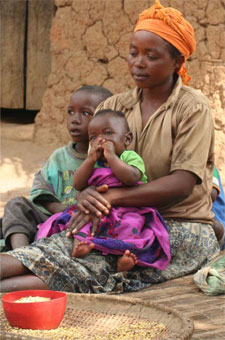The Twubakane Project, supported by the President’s Malaria Initiative through USAID, saves the lives of children by ensuring prompt treatment through home-based management of fever.
Mukamusoni is a mother of four children living in Kirehe District in eastern Rwanda, an area prone to malaria outbreaks. When her children develop symptoms of malaria, she depends on community health workers for treatment. “I’m so glad for the community volunteer. When your child gets sick, day or night, you can get health care quickly and help your children.”
In Rwanda, like many parts of sub-Saharan Africa, malaria is the leading cause of death for children under 5 years of age. It is critical for young children to be diagnosed with malaria and receive treatment within 24 hours of the onset of fever. But families in rural Rwanda often live miles away from the nearest health facility and do not seek immediate care for malaria.
The Twubakane Project, supported by the President’s Malaria Initiative through USAID, saves the lives of children by ensuring prompt treatment through home-based management of fever. Twubakane trains voluntary community health workers to diagnose the disease, provide artemisinin combination therapy drugs, and refer severe cases to the closest health facilities for immediate care.
“Before our neighbor began giving medicine to our children in the home I always had trouble finding the money I needed for consultation fees to bring [them] to the health center. I was forced to [take a ride] to the hospital, where I had to pay so much that I was forced to sell my goats,” explained Verena, a 30-year-old mother with four children living in Kicukiro District, a malaria-endemic area in central Rwanda. After home-based management of fever was introduced in her community, two of her young children were treated by a community health worker and “they have been cured.”
Community health workers not only provide medical care for young children, but also encourage pregnant women to use insecticide-treated mosquito nets and go to the nearest health facility with their husbands to receive pre-emptive doses of antimalarial medications. This treatment reduces the likelihood that mothers will become sick and negatively impact the health of their unborn child.
Home-based management of fever has eased the patient burden on health facilities in Rwanda.
Sister Scholastic, a nurse in charge of childhood illnesses at the Masaka Health Center in Kicukiro District, said that the staff is “no longer overwhelmed by sick patients coming to the health center. The cases of fever are treated at the community level.”

